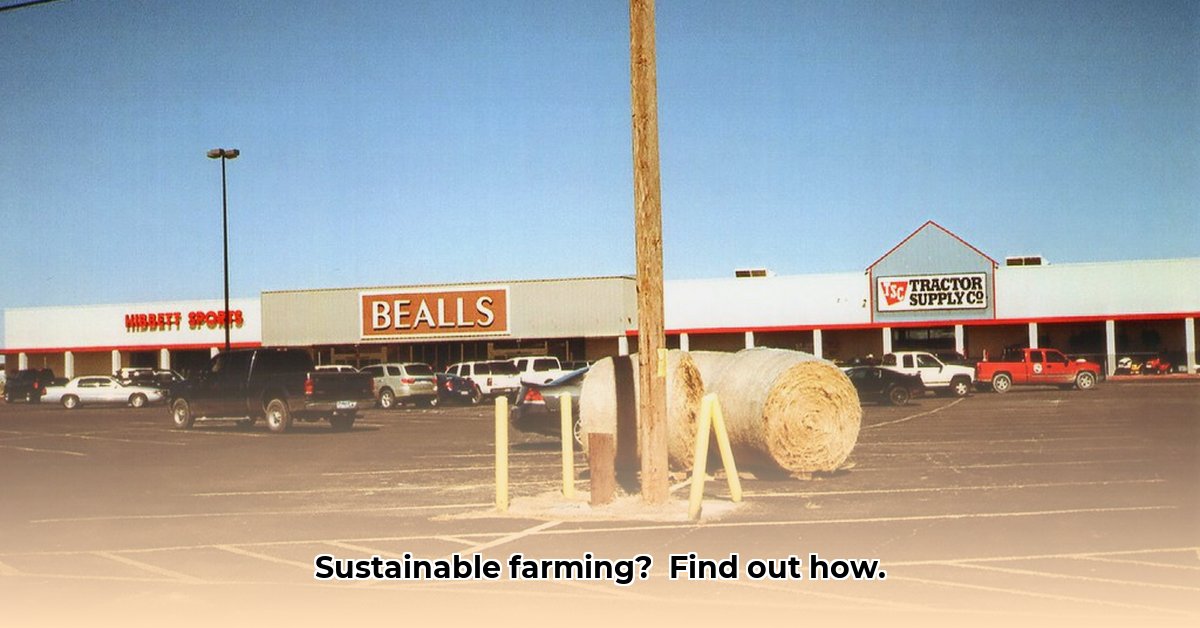
Tractor Supply's Role in Sustainable Agriculture in Fort Stockton
Fort Stockton, Texas, faces unique challenges in maintaining sustainable agricultural practices due to its arid climate and geographical location. This article examines the potential contribution of the local Tractor Supply store to promoting sustainable farming in the region. We will analyze the store's product offerings relevant to sustainable agriculture, acknowledge the limitations of available data, and propose actionable recommendations for improving sustainable practices within the community. For more local information, see this dedicated page.
Tractor Supply's Product Offerings: A Starting Point
Tractor Supply in Fort Stockton offers a range of products that could be used to support sustainable agriculture. Based on information from their website (https://www.tractorsupply.com/tsc/store_FortStockton-TX-79735_1622, accessed February 2025), these include items such as irrigation equipment (though the specific water efficiency of these systems is not specified) and seeds (although the proportion of organic or locally sourced seeds is unknown). However, the extent to which these products support sustainable practices depends heavily on their sourcing, manufacturing processes, and the choices made by local farmers. Do these seeds come from sustainable sources? What about the fertilizers and pesticides sold – are they environmentally friendly? These questions highlight a critical knowledge gap.
Data Limitations: The Need for Transparency
A significant limitation of this analysis is the lack of readily available information regarding the sustainability of Tractor Supply's product sourcing, its own sustainability initiatives (if any), and the actual adoption of sustainable farming practices by local farmers. Without detailed data on the environmental impact of the products sold, it's challenging to fully assess the store's contribution to sustainable agriculture in Fort Stockton. Furthermore, information about potential partnerships with local sustainable farming organizations or internal sustainability programs at Tractor Supply is currently unavailable. This lack of transparency hinders a comprehensive evaluation.
The Impact of Farmer Decisions: A Critical Factor
The success of sustainable farming in Fort Stockton isn't solely dependent on the products available at Tractor Supply. The crucial factor is the adoption of sustainable practices by local farmers and ranchers. Are farmers actively choosing water-efficient irrigation systems, drought-resistant crops, and organic farming methods? Further research is crucial to understand the choices farmers are making and the factors influencing those choices, such as economic constraints, access to information and resources, and established farming practices. This requires quantitative data on farming methods employed by farmers in Fort Stockton.
Actionable Recommendations: A Multi-Stakeholder Approach
To foster sustainable agriculture in Fort Stockton, a collaborative effort involving Tractor Supply, local farmers, and the local government is essential. The following recommendations outline actionable steps, categorized by stakeholder and timeframe:
1. Short-Term Actions (0-1 year):
- Tractor Supply: Conduct customer surveys to gauge interest in sustainable products and adjust inventory accordingly. Analyze sales data to identify areas where sustainable options could be successfully introduced. Begin to explore partnerships with local suppliers of sustainable agricultural products.
- Local Farmers/Gardeners: Explore resources from the Farm Service Agency (FSA) and online educational platforms to learn about water-efficient irrigation, soil health management, and other sustainable practices. Attend workshops or training sessions offered by relevant local organizations.
- Local Government: Allocate resources to support workshops and educational programs focused on sustainable agriculture for local farmers. Explore funding options for farmers adopting sustainable practices.
2. Long-Term Actions (3-5 years):
- Tractor Supply: Develop a comprehensive sustainability plan outlining goals, targets, and reporting mechanisms for sourcing sustainable products and reducing the environmental impact of its operations. Actively partner with local sustainable agriculture organizations.
- Local Farmers/Gardeners: Transition towards fully sustainable farming methods, investing in water-efficient irrigation, using drought-resistant crops, and implementing other soil-health practices. Seek out grants and financial assistance to support this transition. Become active participants in local sustainable agriculture networks.
- Local Government: Establish partnerships between the local government, Tractor Supply, and local farmers to facilitate resource sharing and collaboration on sustainable agriculture initiatives. Develop policies that encourage and support local food systems and sustainable agricultural development.
Conclusion: A Call for Continued Investigation
While Tractor Supply offers a starting point for accessing agricultural supplies, a comprehensive understanding of its role in promoting sustainable farming in Fort Stockton requires further research. Detailed information on the sustainability of its products' sourcing and manufacturing processes is essential. Equally important is data on the adoption of sustainable farming practices by local farmers. This research should involve stakeholder engagement (farmers, Tractor Supply management, local government officials) and focus on quantitative data to assess the impact of various interventions. Only then can we accurately evaluate the current situation and devise strategies to create a truly sustainable agricultural future for Fort Stockton. Further investigation is needed, and collaboration across all stakeholders is key.